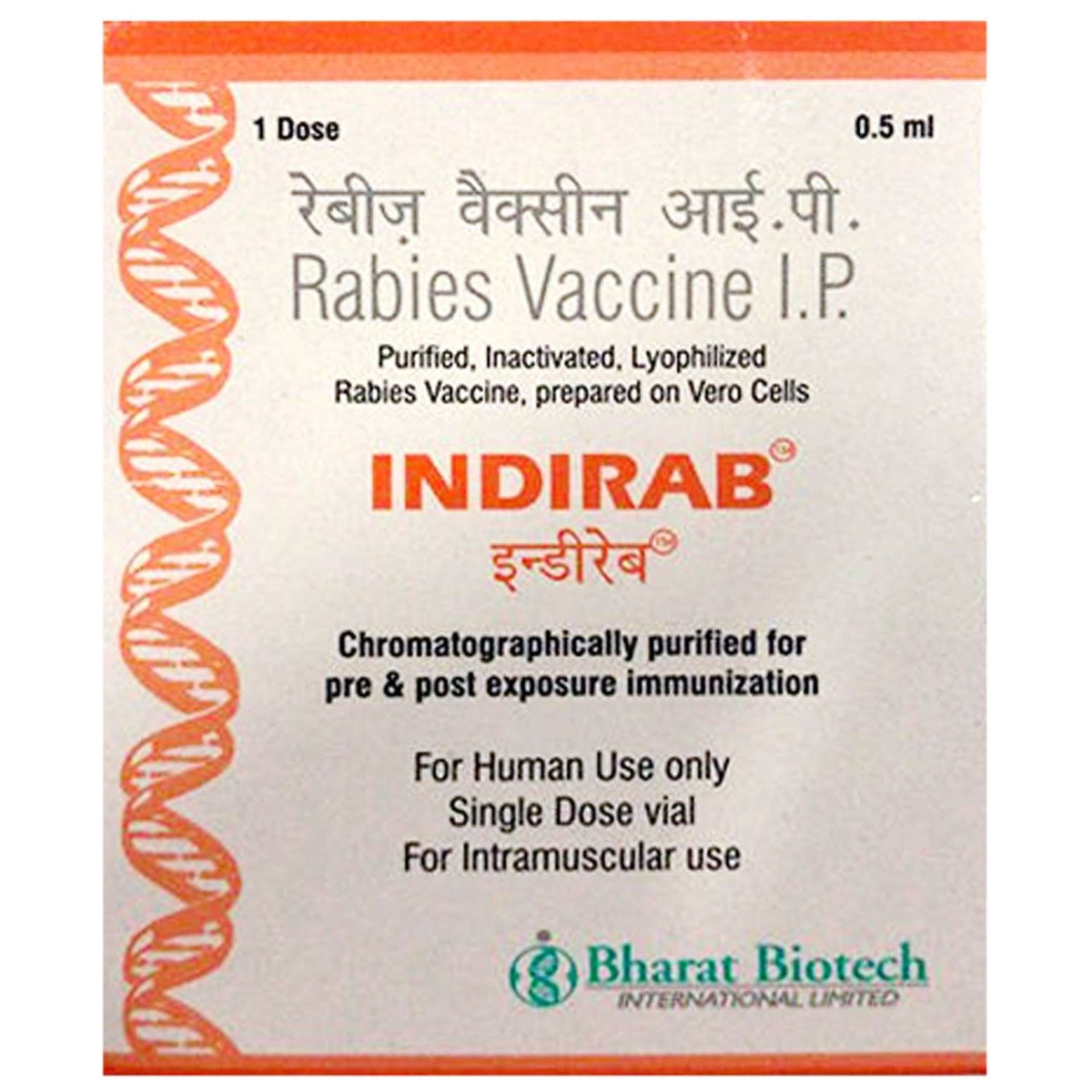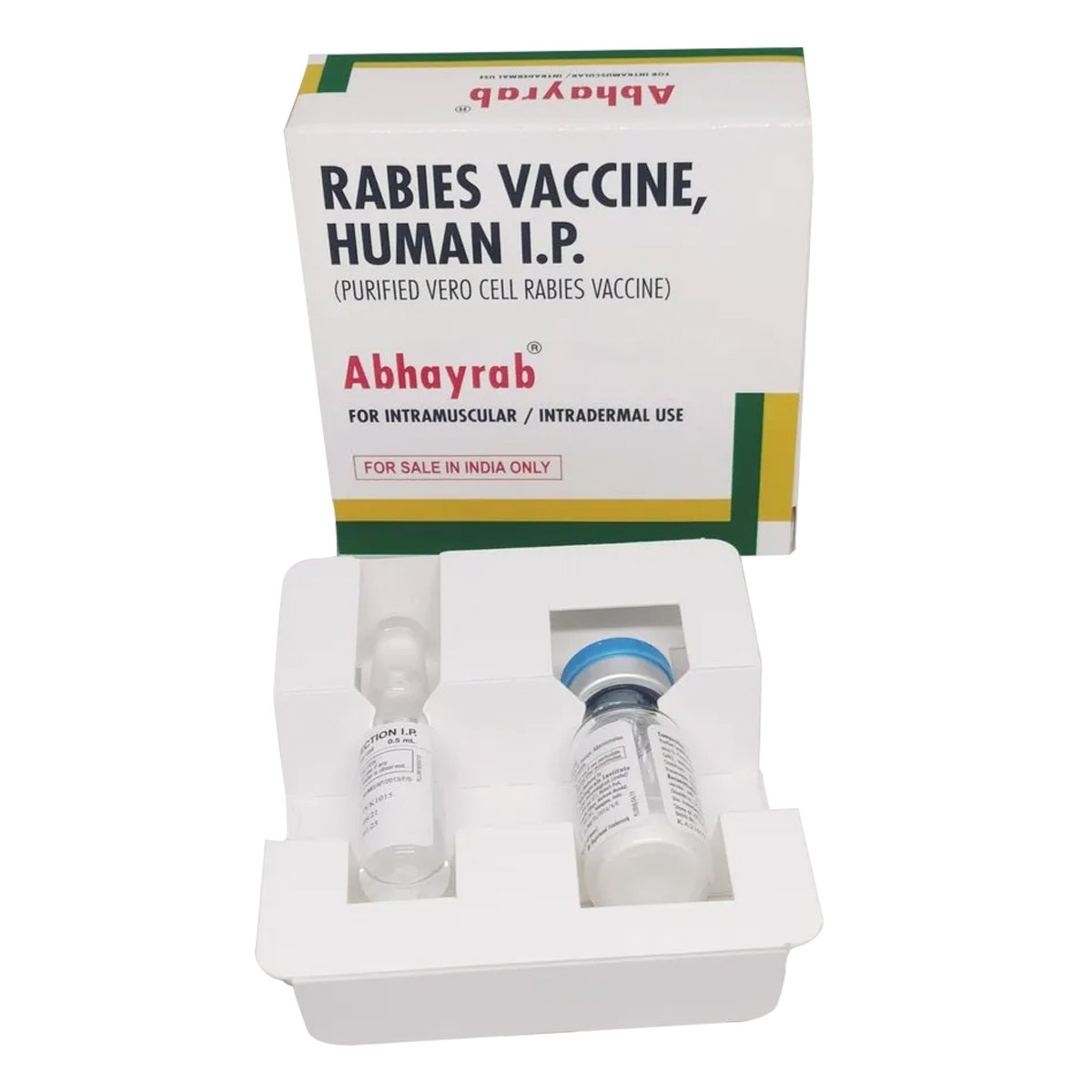Rabies Vaccine
About Rabies Vaccine
Rabies Vaccine belongs to the category of medicine called immunizing agent used to prevent rabies disease. Rabies is caused by a virus called the rabies virus. It is transmitted to humans and other animals through close contact with saliva from infected animals (bites, scratches, licks on broken skin and mucous membranes). Once symptoms of the disease develop, rabies is fatal to that person. Rabies' symptoms include pain or itching at the site of the bite wound, fever, hydrophobia (fear of water), intolerance to noise, bright light or air, fear of impending death.
Rabies Vaccine contains “Rabies vaccine” that provides long-lasting protection against infection from the rabies virus. Rabies Vaccine helps develop immunity by forming antibodies, that protect against infection caused by rabies viruses. It is essential to complete the course of the vaccine to prevent this fatal disease.
Rabies Vaccine will be administered by a healthcare professional. Do not self administer it. In some cases, you may experience some common side effects like, feeling unwell, headache, muscle pain, fever, nausea, injection site swelling, injection site redness, itching, or bruising at the injection site. Most of these side effects of Rabies Vaccine do not require medical attention and gradually resolve over time. However, if the side effects are persistent and worsen, reach out to your doctor.
If you are allergic to Rabies Vaccine or any other vaccination, please tell your doctor. Please inform your doctor if you are using any prescription and non-prescription medications you are taking, including vitamins, herbal supplements. Consult your doctor before taking Rabies Vaccine if you are pregnant, planning for a pregnancy, or breastfeeding. Even if you have been vaccinated, you should still take precautions to avoid contact with rabies. If you have been bitten or scratched by an animal in an area with a risk of rabies, please inform your doctor immediately. Rabies Vaccine is a cold chain vaccine, and so it has to be stored in the refrigerator between 2-8 degrees Celsius else its efficiency might be lost. Do not store in the freezer of the fridge.
Uses of Rabies Vaccine
Medicinal Benefits
Rabies Vaccine contains ‘Rabies vaccine’ that provides long-lasting protection against infection from the rabies virus. Rabies Vaccine helps develop immunity by forming antibodies, that protect against infection caused by rabies viruses. It is essential to complete the course of the vaccine to prevent this fatal disease. It can be used in two ways: Pre-exposure prophylaxis (vaccinating you before you come into contact with rabies virus at the age of 2-10 years) and post-exposure prophylaxis (vaccinating you after you have come into contact with rabies virus). The rabies vaccine is used in all age groups.
Directions for Use
- Follow your doctor's instructions on the dosage and timing of this medication to ensure safety.
- Rabies Vaccine is usually administered by a doctor or healthcare professional.
- Do not self-administer.
Storage
Side Effects of Rabies Vaccine
- Feeling unwell
- Headache
- Muscle or joint pain
- Fever
- Nausea
- Pain, swelling, redness, itching, or bruising at the injection site
Drug Warnings
If you are allergic to Rabies Vaccine or neomycin, betapropiolactone because these are used during vaccine production and may be present in the vaccine in small amounts or any other vaccination, please tell your doctor. Inform your doctor if you have a history of allergy (such as hayfever or asthma). Consult your doctor before taking Rabies Vaccine if you are pregnant, planning for a pregnancy, or breast-feeding mother. Please inform your doctor if you are using any prescription and non-prescription medications you are taking, including vitamins, herbal supplements. You must receive all the vaccination doses. Immunosuppressive treatments, including long-term corticosteroid therapy, may interfere with antibody production and cause rabies' failure. It is advisable to perform a serological test 2 to 4 weeks after the last injection. Even if you have been vaccinated, you should still take precautions to avoid coming into contact with rabies if you are travelling in an area where rabies is found. Please contact a doctor immediately if you have been bitten or scratched by an animal in an area with a risk of rabies.
Drug Interactions
Drug-Drug Interactions: Rabies Vaccine may interact with corticosteroids (hydrocortisone, methylprednisolone, prednisolone, dexamethasone, prednisone) and immunosuppressive drugs (azathioprine, mycophenolate, cyclosporine).
Drug-Food Interactions: No interaction found.
Drug-Disease Interactions: Rabies Vaccine should be given with caution, especially if you have a history of asthma or hay fever and blood disorder.
Drug-Drug Interactions Checker List:
Safety Advice

Alcohol
cautionNo interaction found/established. Please consult your doctor before using $nsme.

Pregnancy
cautionIf you are pregnant, consult, and seek advice from your doctor before receiving the vaccine.

Breast Feeding
cautionPlease tell your doctor, if you are a breastfeeding mother before receiving the vaccine.

Driving
safe if prescribedThere are no known effects of Rabies Vaccine on your ability to drive or operate machinery.

Liver
safe if prescribedLet your doctor know if you have liver disease/conditions.

Kidney
safe if prescribedLet your doctor know if you have kidney disease/conditions.

Children
safe if prescribedRabies Vaccine can be given safely to children provided; dose has to be prescribed by a doctor.
Habit Forming
Diet & Lifestyle Advise
- Avoid intake of processed foods, foods high in sugar and fat, as these may cause inflammation.
- Add foods rich in magnesium like avocados, flax seeds, corn, oatmeals, curd, pumpkin, and high protein foods such as milk, egg, meat in your daily diet.
- Opt for food and drinks high in Omega 3 fatty acid to get relief from pain, swelling, and inflammation. Omega 3 fatty acid-enriched foods include flaxseeds, walnut, soybean oil, salmon, and tuna fish if you prefer non-veg.
- Wounds should be washed immediately with soap and water for 10–15 minutes. It should be cleaned thoroughly with 70% alcohol/ethanol or povidone-iodine, if available.
- Do not apply irritants to the wound, such as chilli powder, plant juices, acids, or alkali.
- Do not cover the wound with dressings or bandages.
- Take the person to a healthcare facility for further treatment immediately.
Special Advise
- Separate injection sites and separate syringes must be used in the concomitant administration with any other medicinal product, including rabies immunoglobulin.
- Immunosuppressive treatments, including long-term corticosteroid therapy, may interfere with antibody production and cause rabies' failure. It is advisable to perform a serological test 2 to 4 weeks after the last injection.
Patients Concern
Disease/Condition Glossary
Rabies: It is a viral disease that causes serious infection and progressive and fatal inflammation of the brain and spinal cord. It is transmitted to humans and other animals through close contact with saliva from infected animals (bites, scratches, licks on broken skin and mucous membranes). Once symptoms of the disease develop, rabies is fatal to both animals and humans. It has two forms: Furious rabies (characterized by hyperactivity and hallucinations) and Paralytic rabies (characterized by paralysis and coma). Furious rabies symptoms are hyperactivity, excitable behaviour, hydrophobia (fear of water), aerophobia (fear of drafts or fresh air), and death that occurs after a few days due to cardio-respiratory arrest. Paralytic rabies runs a less dramatic and usually longer course than the furious form. Symptoms are muscles gradually become paralyzed, starting at the bite or scratch site, a coma slowly develops, and eventually, death occurs.
FAQs
Rabies Vaccine is used to prevent rabies disease.
Rabies Vaccine works by helping the body produce substances (antibodies) that resist infection from viruses causing rabies.
Yes, Rabies Vaccine is safe and potent and can be given to pregnant women. It has no effect on fetal development during pregnancy. However, If you are pregnant, Inform your doctor before receiving the vaccine.
The common sign and symptoms of rabies in humans include pain or itching at the site of the bite wound, fever, hydrophobia (fear of water), intolerance to noise, bright light or air, fear of impending death, irritability and depression, at a later stage the mere sight of water may provoke spasms in the neck and throat.
Rabies is an infectious disease transmitted from animals to humans, which is caused by a rabies virus. Rabies has two forms: frantic and paralytic. Frantic rabies is the most common form of human rabies.
Rabies spreads through bites from an infected animal. But it can also spread if the animal's saliva (spit) gets directly into a person's eyes, nose, mouth, or an open wound (such as a scratch or a scrape). It's important to consult your doctor, if you are bitten or scratched by an animal that might have rabies.
Yes, rabies is preventable. It can be prevented through vaccination and if you are bitten or scratched by an animal, wash the wound thoroughly with soap, water and seek medical attention immediately.
Rabies Vaccine is given to the people who either have been or are at risk of being bitten, scratched or licked by an animal infected with rabies virus.
The common side effects of Rabies Vaccine are feeling unwell, headache, muscle pain, fever, nausea, injection site swelling, injection site redness, itching, or bruising. If any of these side effects persist or worsen, please consult your doctor.
Rabies Vaccine is not recommended to use in people who are allergic to Rabies Vaccine, who have severe allergy to chicken eggs and who are suffering from any illness or fever or have acute infection. Also, inform your doctor if you are breastfeeding, pregnant or planning pregnancy.






